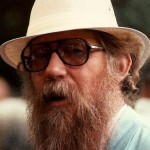Shriver Stories: Sarge in Debre Markos
Jon Ebeling (Ethiopia 1962-64) spent five years with the Peace Corps as a PCV and APCD in Ethiopia. Upon returning he entered the Ph.D. program at the University of Pittsburgh’s Graduate School of Public and International where he earned his Ph.D. in Economic and Social Development. As he graduated from the University, he came down with a severe case of juvenile diabetes and could not return to Africa.
He taught statistics and public finance in the Department of Political Science at CSU, Chico for 32 years while directing over 200 master’s degree thesis until his retirement. He has done extensive consulting with governments and private industry in the area. He specializes in revenue forecasting, evaluation research, and public opinion research. He has taught off and on in the Economics Department as needed since the early 1970’s. Jon and his wife, Frederica Shockley, Chair of the Economics Department now have a consulting business. Here is Jon’s story of meeting Sarge in a remote southern town in Ethiopia where he taught his first year as a PCV.]
“During the Cuban missile crisis in October of 1962, I was struggling to explain events to my inquisitive 11th grade class in Debre Markos when I looked up to see Harris Wofford’s face in a hole in the door where the window used to be. I was startled and went to the door of the classroom and there was Wofford, Shriver, a pilot, and a news man from the SF Chronicle. Wofford was our CD Ethiopia at the time and Shriver, of course, was then the Director.
‘Here is someone who can tell you all bout the Cuban missile crisis!’ I said, turning to my students as I invited the men into the classroom at Negus Tekle Haimanot School. ‘Sargent Shriver can speak more authoritatively than I since he is related to President Kennedy.’ Shriver spoke to the students and won them over with his New England accent, his quick wit, and his wonderful smile. He won me over as well.
After about a half an hour, we let the students out of their classes and all the PCVs went with Shriver and Wofford in our house. Those days we had a kerosene driven refrigerator with cold beer in it and we spent the afternoon sitting around our tukul house talked about how we could make the Peace Corps more effective in our town and focused on how we might relate better to the Ethiopian society.
Shriver told us to go to the bars in town and talk with the local Ethiopians. Now there were eight guys assigned to that town and we all thought Shriver’s suggestion was wonderful advice. After exhausting our beer supply Shriver, Wofford, and the pilot headed out for the grassy airstrip to fly back to Addis, leaving us all in the after glow of his surprise visit from Washington.
Years later, I was attending U.C.L.A. graduate school in African History and went to Washington, D.C. for a meeting of RPCVs. It was the first reunion of RPCVs and several thousand turned up at the capital. The weekend opened with a fancy reception for all the RPCVs at the State Department, and I remember how impressed I was walking into a beautiful stately reception room in Foggy Bottom and spotting Shriver standing the middle of a crowd. I walked over and worked my way through the press of people surrounding him, hanging on everyone of his words, and then Shriver, in full sentence, spotted me, stopped talking and reached out to shake my hand and asked me, as if it had only been yesterday, “Hello Jon! How’s Debre Markos?”
Is there any wonder why those of us who served under Sarge don’t idealize the man?
No comments yet.
Add your comment